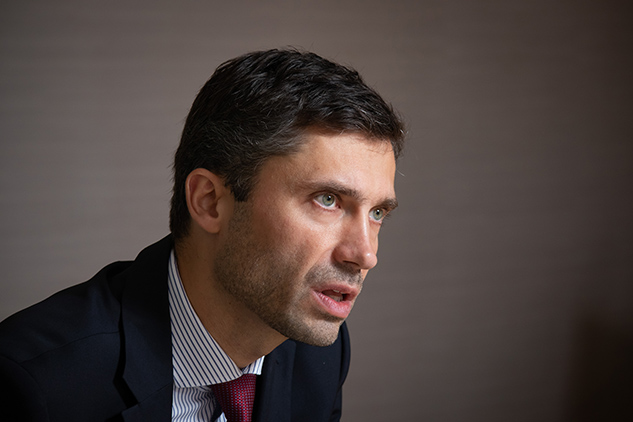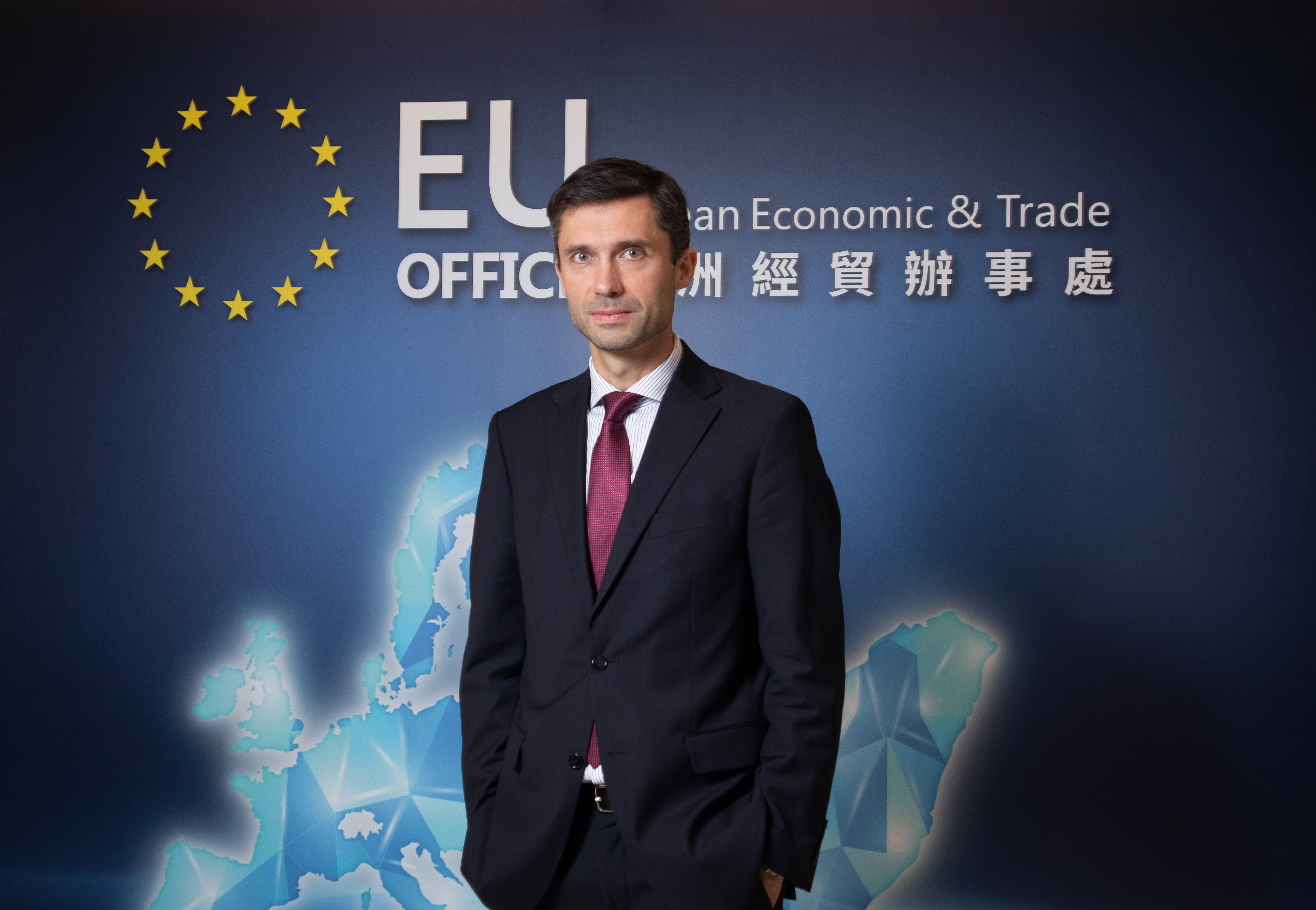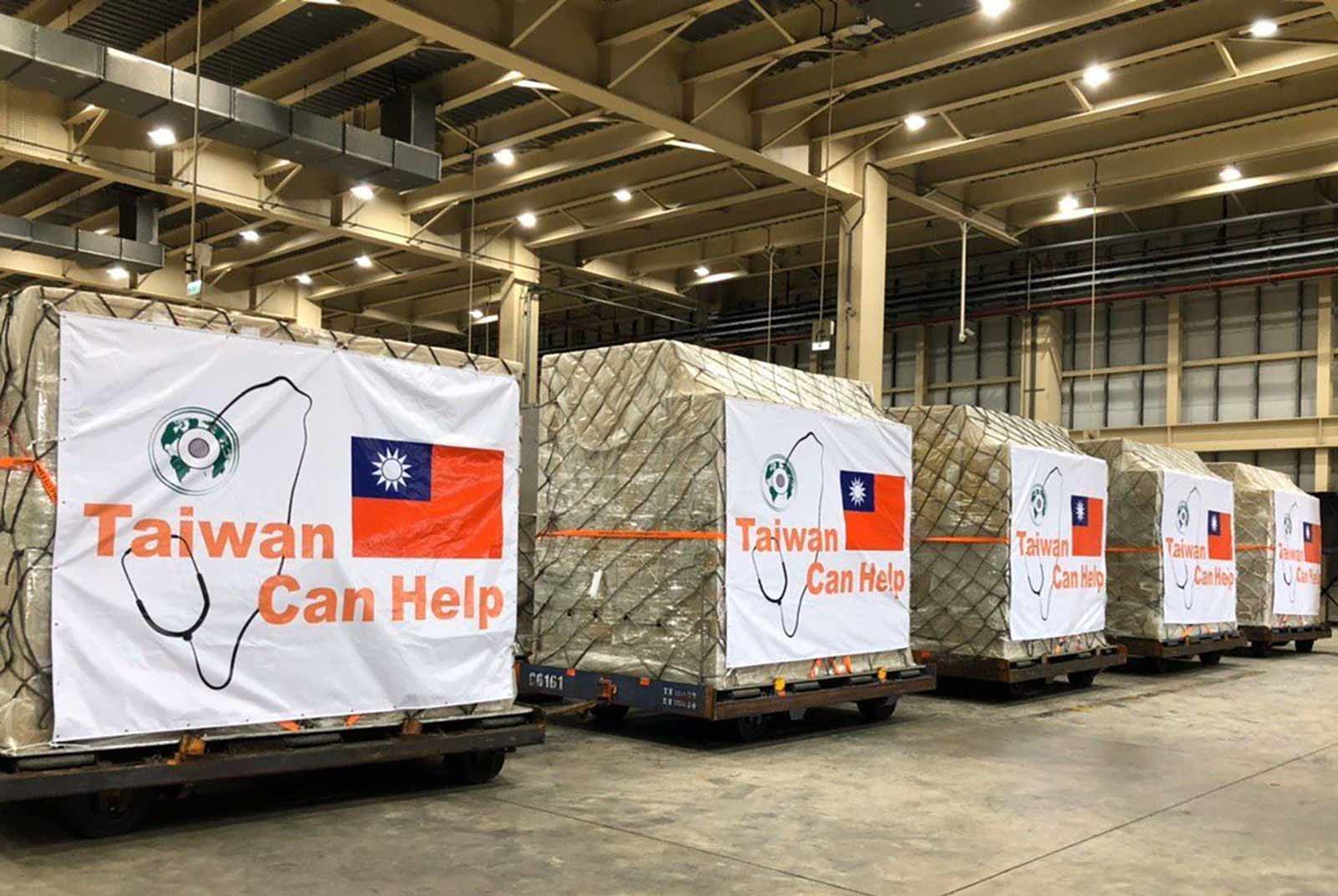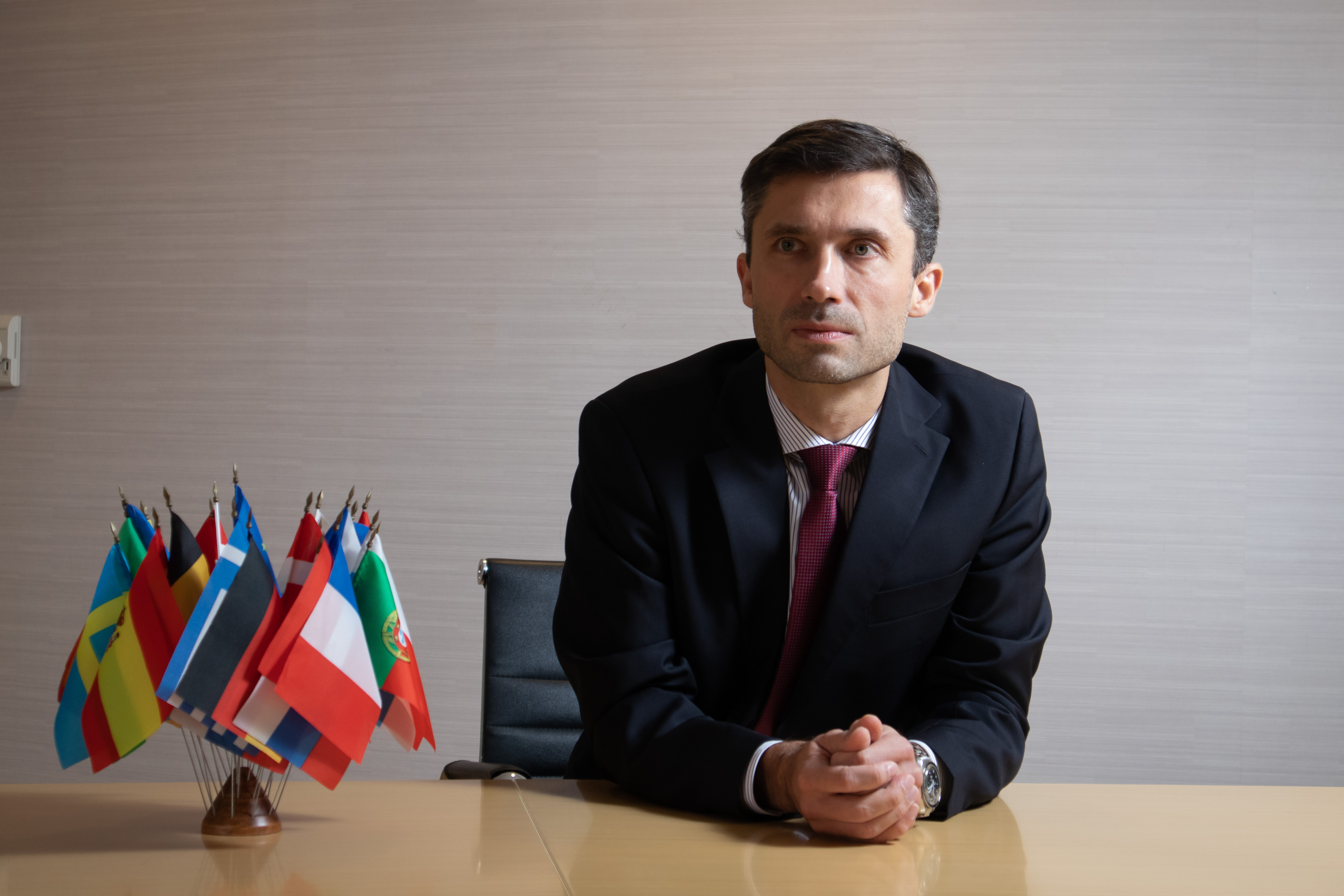EU representative: Taiwan’s COVID-19 fighting experience is an inspiration for Europeans

Source:Ming-Tang Huang
As the world remains in lockdown, Taiwan is lending a helping hand. For the first time ever, EU leaders openly addressed and thanked Taiwan for the donation of 5.6 million face masks to the most needed places. How did the EU representative in Taiwan pull this off? And why does he think this means closer EU-Taiwan cooperation in the future?
Views
EU representative: Taiwan’s COVID-19 fighting experience is an inspiration for Europeans
By Kwangyin Liuweb only
For Filip Grzegorzewski, it was certainly an Easter holiday he would remember for a long time.
Just half a year since the 44-year-old head of the European Economic and Trade Office (EETO) started his new posting in Taiwan, the world is in a month-long lockdown to prevent the spread of the coronavirus. As global travel restrictions continue, Grzegorzewski’s Easter holiday plans needed to be adjusted.
“My family in Poland and I organized a video conference Easter meal,” he said in an interview with CommonWealth Magazine. “They were having breakfast in Poland and we were having dinner in Taipei.”

Some things remained the same. In both meals there was salad, a traditional Polish Easter cake - mazurek, and they also shared the eggs, which is a symbol of life.
Eating at home was not the family’s only Easter activity. They took the opportunity to cycle around Sun Moon Lake in Nantou and hiked through the Taroko Gorge in Hualien, all the while keeping to the social distancing rules.
“I am very happy to be in Taiwan; it’s among the very few places in the world not in a lockdown,” Grzegorzewski said he appreciated the opportunity to travel freely around the island.
Just as the great outdoors is important for the Polish diplomat, a more crucial task at hand is coordinating EU-Taiwan collaboration efforts, even though every discussion has been taken online.
The EU-Taiwan relationship saw a breakthrough moment in early April, when European Commission President Ursula von der Leyen thanked Taiwan in a Twitter post for the donation of 5.6 million masks to help fight the coronavirus. “We really appreciate this gesture of solidarity,” she added.
The European Union thanks Taiwan for its donation of 5.6 million masks to help fight the #coronavirus. We really appreciate this gesture of solidarity. This global virus outbreak requires international solidarity & cooperation. Acts like this show that we are #StrongerTogether.
— Ursula von der Leyen (@vonderleyen) April 1, 2020
It marked the first time an European Commission president has directly addressed Taiwan in an official communication.
Representatives from the Czech Republic, France, Germany, the Netherlands, Poland and Slovakia also expressed gratitude for Taiwan’s expression of solidarity.
It was the first time ever for Taiwan to be recognized openly by so many EU member states.
And Grzegorzewski is confident that by continuing to show solidarity and a willingness to share resources, more and more states will see Taiwan as an indispensable partner.
“Taiwan is a source of inspiration for the Europeans,” he said, adding that no matter how long it would take for the world to ride this crisis out, the nations are stronger together. Read the exclusive interview below:
CommonWealth Magazine: What is the focus of EU-Taiwan relations this year? (pre-coronavirus and post-coronavirus)
Grzegorzewski: My ambition is not to put EU-Taiwan relations on hold. Even the world is on a crisis mode. We have a partnership that cannot be put on pause. We’ve made plans to expand our relationship this year. Big projects are still going on despite the events being postponed.
On the trading side, Taiwan is the 15th largest trading partner for the EU, and the EU is the 5th largest trading partner for Taiwan. The trading numbers exceed 60 billion Euros per year. We have a dense network of consultation, working groups, dialogues, events, seminars, through which we align our business practices closer.
There is a special program called EBRC, or European Business and Regulatory Cooperation. Especially designed for Taiwan with substantive funding from the EU. This is aimed at improving business and regulatory cooperation between the European Union and Taiwan.
Before the coronavirus outbreak, we were planning the European innovation week, European investment forum, Energy business roundtable, and Connectivity seminars between EU and Taiwan. Of course they would need to be pushed back to the second half of the year because of the virus.

We have several focus areas of cooperation, such as the digital agenda, green energy and investment. And of course the issues between Taiwan and the EU that need to be solved, namely the trade irritants. SPS regionalization, trades in organic, and local content requirements. These are the issues that require lots of good will on both sides and we are happy to see that.
In a post-coronavirus world, we need to work more on the supply chains between the EU and Taiwan. Taiwanese government’s stimulus package will provide support to the domestic industry, this will definitely cushion the negative impacts of the damaged bilateral EU-Taiwan trade.
However, sustained travel restrictions would cause serious problems, for the supply chains and also for the services industry. The offshore wind sector is a good example, where Europe is the main investor and we have to make sure that the investors, the experts and the engineers can actually come to Taiwan. So we have to find a way to open up again.
It is good timing for the EU and Taiwan to have closer cooperation. Given Taiwan’s resilience and experience in effectively addressing the pandemic and its strong position in key supply chains. In particular in areas like digital economy or green energy.
C: How can the EU and Taiwan work together in fighting the COVID-19 pandemic?
G: Cooperation is expanding now during the crisis. We have facilitated contacts between the European Union and Taiwan. In the research field, we helped organize a video conference between Academia Sinica and Brussels, regarding the development of rapid tests for COVID-19.
We are in regular contact with Taiwanese institutions and research centers, which are world leaders in the development of tests and vaccines against the virus. Our ambition is to bring together the researchers to speed up work on the new medical solutions. That's one thing.
The second phase will be allowing those new medical developments proper access to markets. Such as getting the approval as quickly as possible for new tests, new vaccines on the market.
And the third phase will be commercialization and making sure that as soon as those developments are there, the whole world can benefit from it. So we are trying to link the researchers with business communities across the borders, and to make sure that the regulators are also on board.
We also shared in the EU the experience of Taiwan tackling the coronavirus. Taiwan was very quick in implementing the measures. It is impressive to see how fast and effective its response was.
As the head of the office here I thought this experience would be useful for the Europeans. So we've reported it to Brussels and it was shared among the member states.
C: Has any EU member countries or cities implemented the experience shared from Taiwan?
G: Taiwan is a source of inspiration for the Europeans.
We are eager to understand how Taiwan has been so successful in containing the spread of the virus. They might not easily be reproduced in Europe. The fact that Taiwan is an island helps. But other than that, there are measures that have inspired the European governments.
I want to take this opportunity to thank Taiwan for the donation of face masks to Europe. That's something that proves that Taiwan is a real friend.
 Sourece: Twitter@MOFA_Taiwan
Sourece: Twitter@MOFA_Taiwan
The European Union is a powerful, resilient political and economic entity and will surely catch up with the production of necessary protective and medical equipment, but the first reaction to this outburst of the epidemics was quite difficult for us. There were countries in Europe that faced real difficulties. So, this donation was very much appreciated. I wanted to also recall the words of President of the European Commission von der Leyen who thanked Taiwan for this expression of solidarity.
This crisis highlights that no country is an island. And as President Tsai said, Taiwan will not be safe if this global pandemic continues. We all have to work with others and this multilateral cooperation is very important.
There was also a quote by Federica Mogherini, the previous EU foreign affairs chief. She once said that in the world of today there are no big or small Member States; there are only member states that are small, and those that have not yet realized that they are small. We are only as powerful as our work together allows us to be.
So, this act of solidarity of Taiwan is significant. And this was not a one-off, but a plan to show not only the experience but also concrete aid to Europe, the United States to the diplomatic allies to other countries in need.
C: Regarding the donation of masks. How did it happen?
G: That was an idea that came up in my conversations with Foreign Minister Joseph Wu and Deputy Minister Kelly Hsieh. We were banging our heads together to think of how Taiwan can help. And I was really impressed with a lot of goodwill from the Taiwanese side to go beyond words. We were discussing the basic needs of Taiwan, of the European Union now, as people in Italy and Spain were really suffering. I was very grateful to hear from Minister Wu that Taiwan not only can help, but Taiwan is helping.
C: When you first brought the idea to Brussels. What was the reaction of the member states?
G: The response across Europe was very positive. Everyone took it as a gesture of solidarity, as a humanitarian aid, coming from friends in the testing moment of a crisis. No one had political second thoughts about it. Because there were no political strings attached to this donation. It's a simple gesture of solidarity and this is how we took it.
This aid was channeled through the networks of foreign missions of Taiwan in Europe, and also through the rescue mechanism in Brussels. We facilitated the distribution of masks by working together with the Taiwan side and identifying the needs.
We worked together with the Ministry of Health and Welfare to come up with a list of countries in Europe that were most affected by the virus, through the rescue mechanism we received requests from different Member States on their basic needs. This is how we facilitated this donation.
C: You have been in Taiwan for around half a year. What are some of the things that surprised you, especially during these strange times?
G: I have been receiving calls from my colleagues in Brussels, telling me that they are ready to move to Taiwan and telework from here. This is to show you how different the situation Taiwan is in now.
People in Taiwan are fantastic. I think that's the biggest asset. Because they're very resilient. They know how to go beyond their selfish needs at every possible level. It's seen on the streets when people are very disciplined in implementing all the measures: putting the masks on, washing their hands and doing everything that limits the spread of the virus.
Taiwan has also expressed solidarity, this ability not to be selfish, also on the global level by sharing your resources. Not only the know-how but also the medical protective equipment. This impresses me a lot.
At the beginning of the outbreak, when the first travel bans were introduced some of my colleagues in the region were trapped in different locations. And those who were normally based in the Philippines or Beijing worked from Taipei for a while.
C: There's been discussion on how the pandemic will jeopardize the European unity. As the world becomes more polarized and segregated, what can be done to maintain openness and solidarity?
G: I think there are two aspects.
For one thing, this pandemic actually is a showcase of openness and solidarity within the European Union. Bad news is more attractive than good news, but there are lots of really encouraging stories coming from Europe about solidarity between nations. For example, German hospitals bringing in patients from France, Austrian hospitals bringing in patients from Italy, and medical doctors from Poland and Bulgaria are working in Italy. It's a showcase of solidarity.
The second thing is about the nature of the European Union. European Union is a very strange animal. It's neither a state nor an international organization. And it is only as strong, and as effective, as the member states want it to be.

Before this pandemic, we have never had the necessity to work together so closely on health issues. There was no need to have such an enhanced cooperation on medical aspects.
And still, we took this crisis as a challenge for us. That brought together the political cooperation of medical issues as well. And we've created the whole structure of the EU level so transnational multilateral level cooperation on medical issues was possible. So we've had regular meetings of the health ministers, coordinating their actions and taking a coordinated approach to face the crisis.
We have the economy ministers talking now about the next steps. We had our leaders discussing how to ease the restrictions and the lockdown in order to restart the economy. The nature of the European Union is integration, and it will continue to be that way. Solidarity and coordination is the only answer to solve the global problems.
As I said before, no country is an island, especially when you have to face an invisible enemy that is the coronavirus. “EU solidarity” and “Stronger Together” are the hashtags we use all over. These are the two messages that really point to the solution for the present situation.
Have you read?
♦ How Taiwan combats the coronavirus, an inside look
♦ COVID-19: How Taiwanese Companies Are Rethinking 2020
♦ Where is Globalization Headed Amid COVID-19 Epidemic?
Uploaded by Judy Lu







